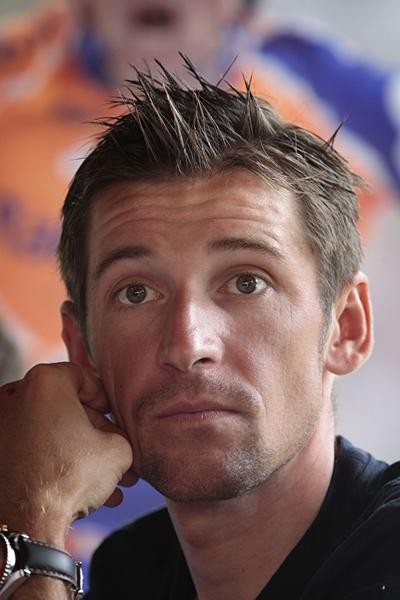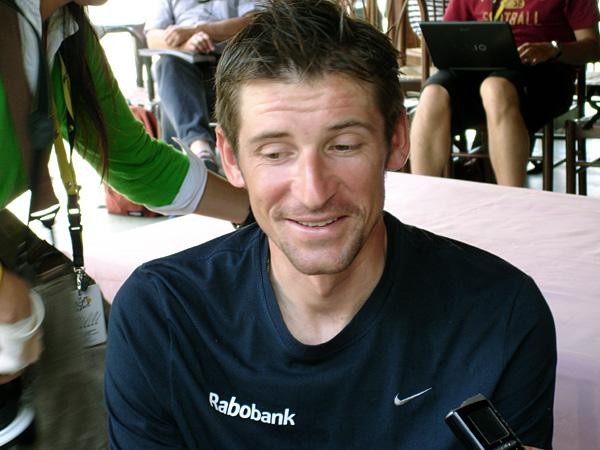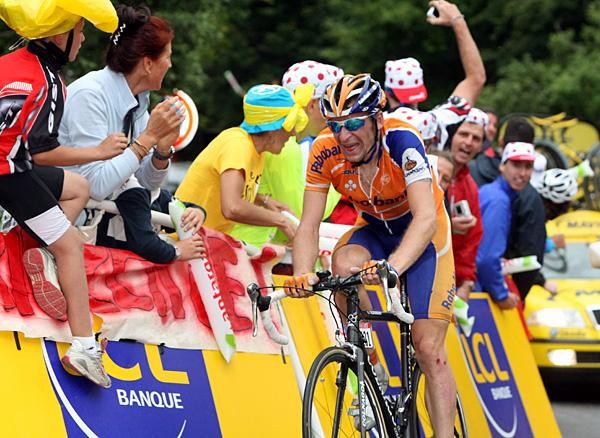Menchov counting on experience
Without intending so, green jersey wearer Oscar Freire revealed Rabobank's general classification...



Tour de France News feature, July 22, 2008
Without intending so, green jersey wearer Oscar Freire revealed Rabobank's general classification strategy at the Tour's second rest day in Cuneo, Italy. Nicely seated under shady pavilions nearby the hotel pool, journalists asked the triple world champion if he was confident to carry the jersey to Paris. The Spaniard replied: "I won a stage and scored more points, and as we hope Denis will be the overall leader after the time trial...". By that time he realised that maybe it hadn't been a good idea to put it this way, and everybody laughed.
Call it a slip of tongue, but Freire's assessment could be pretty close to the reality of the Dutch team's wishes for the rest of the race. Denis Menchov, double winner of the Vuelta a España is not only a respected climber, but even more so a gifted time triallist. Compared to some of his current rivals, this could provide him with the necessary advantage to realise an overall Tour de France victory.
The Russian is currently ranked fourth, 30 seconds behind Cadel Evans (Silence-Lotto), still the favourite for the top spot on the Champs Elysées in Paris. Asked what sort of margin he needed on the Australian to take the yellow jersey at the race's final time trial, Menchov answered: "If I could choose, I'd prefer three minutes! But if the gap remains as it is, it could be enough. It's only 30 seconds. I feel strong, and I think that he's not much stronger than me in the time trial. After three weeks, everything is possible.
"I think we are in a really good position right now. It's better than it was after Hautacam - almost half a minute less [Menchov was 57 seconds down on Evans after the first Pyrenean mountain stage - ed.]."
The Rabobank leader thus relies on a small margin in front of Evans, which could see him just follow the rest of the favourites during the next two days in the Alps, before the race heads back to the French plains. But he said that he felt good and confident enough to try and drop some of his rivals in the mountains again, explaining that he rated stage 16 to Jausiers as dangerous as the next day to L'Alpe d'Huez, even though the route on Tuesday does not involve a mountaintop finish.
"The next two stages are important for me," he said. "Everybody focuses on L'Alpe d'Huez, because it is said to be the Dutch climb - and it is a special mountain - but tomorrow's stage could also turn out to be the hardest stage of the Tour, the one that proves to be decisive. You never know...
Get The Leadout Newsletter
The latest race content, interviews, features, reviews and expert buying guides, direct to your inbox!
"The first climb [the Col de la Bonnette-Restefonds - ed.] could very well be the hardest climb of the whole Tour. It's a long climb, and very steep in the last 10 to 12 kilometres. Also, it is at high altitude."
Menchov explained he had been surprised that the stage prior to the rest day had made a difference in the classification. "Before yesterday, I also thought that the stage to Prato Nevoso wouldn't be really important, as the final climb was not so hard," he said. "I thought that we'd get to the line with five or six riders, all clocking the same time. But finally, it was much better than I expected."
The day prior to the rest day in Cuneo, Menchov was able to drop Fränk Schleck (Team CSC), Christian Vande Velde (Garmin-Chipotle), as well as Evans by a few seconds. But just as he was placing an attack on the final climb up to Prato Nevoso, the 30 year-old crashed. Coming back on the incident, Menchov played down the impact this had on the outcome of the stage.
"That's just the way it goes... that's cycling. Sometimes you are unlucky. The most important thing is that I felt really good yesterday, especially until the crash," smiled the Russian, who was barely hurt. "The accident disturbed my concentration a bit, but I was still able to come back to the favourites' group and continued my plan. I put some time into Evans, and didn't lose a lot on Sastre and Kohl. It was a good day."
And Menchov hopes to continue this way. "I think this is what I have to do in the next few days, continue like this. Not lose time on Sastre and Kohl, and try to get some time on Evans." In order to do this, the Rabobank leader hoped to take advantage of the work of Danish team CSC. "They are the ones who have to move - if they want to win the Tour de France, it's more important for them to make up some time in the mountains than it is for me."
But the Rabobank leader reckoned he has to focus on more than these three riders to remain in contention for the yellow jersey. "There is a group of five or six riders that has basically the same time. They are all showing excellent performances, so we need to take these riders into account, too," he said.
Out of this handful of riders, Menchov declared Team CSC's Carlos Sastre to be his most dangerous opponent. "Sastre has shown that he is the specialist of these three-week races. These last three or four years, he's always been up front. He is a man with a lot of experience," Menchov said.
Speaking of experience, this was a quality the Russian thought he had gained in recent years, which he rated as being one of the reasons why he is now closer than ever to a Tour de France victory. Asked what had changed since his last attempts to win the French Grand Tour, Menchov replied: "I haven't changed a lot of things at all. I think what has changed is my age. I'm 30 years old now, and I gained experience every year. That's only normal, after coming here again and again all these years. Of course it's important to have a strong motor and a good preparation, but experience is also vital."
And winning another Grand Tour certainly helps. Menchov is the only Grand Tour winner, besides Damiano Cunego (Lampre), that is left in the race. "That was an important step in my career, of course," he said, speaking of his 2007 Vuelta victory. "I showed that I'm able to win a Grand Tour, that I can do it over three weeks and not only over ten days like at the Tour de l'Avenir. It was good experience, and a good sign for the future."